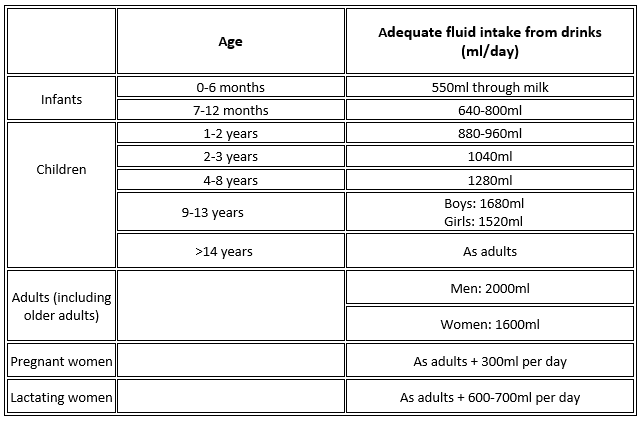Is 100% Grapefruit Juice Hydrating?
100% grapefruit juice naturally contains a high percentage of water – almost 90 percent. It also contains electrolytes, such as potassium and magnesium which can aid in fluid balance. 100% grapefruit juice can be a good beverage of choice to support fluid balance!
What Does Water Do For You?
Water is critical for your health as it is the main component of all cells. Water assists in the passage of fluids such as oxygenated blood into the cell and is involved in an abundance of cellular processes.1 Adequate hydration is extremely important for the body to maintain proper function including maintaining body temperature, regulating blood pressure, and transporting nutrients throughout your body.1 Adequate hydration may even support the appearance of healthy skin by improving skin elasticity.2
What Are Electrolytes?
Electrolytes include nutrients such as potassium, sodium, and magnesium. In fluids, these nutrients carry an electric charge which allow muscles to contract and nerves to transmit signals. Electrolytes are critical for the human body to function. Your heart could not beat without them.
Electrolytes are lost throughout the day with fluid losses, especially with sweat. Plain or pure water contains few, if any electrolytes, so you must replace lost electrolytes by consuming foods that contain these nutrients. Drinking fluids, such as 100% grapefruit juice, that contain both water and electrolytes may help support hydration.
Electrolytes In Grapefruit
Potassium is the major electrolyte within all cells. It helps to balance fluid in the body by having a strong relationship with sodium, the major electrolyte in the blood and outside of the cells. Most people do not get enough potassium and consume too much sodium.3 A 150ml glass of 100% grapefruit juice delivers 6% of the reference intake (RI) for potassium, while one-half of a medium fresh grapefruit (120g) contributes to 8%.*
Magnesium is the fourth most abundant mineral in the body and is essential in the regulation of muscle contraction, cardiac excitability (current flow through cardiac cells), blood pressure, and other vital processes.5 A 150ml glass of 100% grapefruit juice delivers 3% of the recommended daily intake for magnesium.*
Fluid Requirements

The amount of fluid needed each day varies by age, gender and lifestage1
Source: https://www.bda.uk.com/resource/fluid-water-drinks.html
Fluid needs are increased during physical activity, exposure to heat or cold, with increased altitude, wounds, persistent diarrhoea or vomiting, fever, burns, certain medications (e.g. diuretics), and during pregnancy and breastfeeding.1,6
Symptoms of Dehydration
Dehydration may produce symptoms of thirst, fatigue, darkening and reduction of urine, and may affect cognition and motor control.1 Indeed, poor physical performance due to dehydration, such as with sports activities in warm weather, is well-documented.7
Most people can maintain adequate hydration by drinking when thirsty and eating a healthy diet.1 However, both underhydration and overhydration (due to lack of electrolytes by overconsuming pure water) can impair performance, particularly in athletes.8 Individuals may benefit from fluids with carbohydrates and/or electrolytes during extensive periods of exercise, and beverages that appeal to taste preferences may encourage individuals to drink.8 Thus, grapefruit juice may be a good choice to support hydration and offers a healthier alternative to branded sports drinks that contain added sugar.
DID YOU KNOW?
100% grapefruit juice is about 90 percent water which can help contribute to hydration.4
Kidney Health and Florida Grapefruit Juice
Here are a few things you can do to help reduce your risk of getting kidney stones:
- Stay hydrated – drinking fluids helps dilute the substances that lead to kidney stones. 100% grapefruit juice is ideal for hydration because it contains a high level of water content – around 90 percent.
- Avoid too much salt – excess salt is associated with calcium loss, making calcium available to bind to other compounds in urine to form stones.
- Limit animal protein – consuming too much animal protein can lead to high levels of uric acid that may lead to stone formation. Animal proteins also contain phosphates, another factor that may raise the risk of kidney stones. 9
- Drink Florida Grapefruit Juice – along with other citrus beverages, grapefruit juice has citrate, which may help prevent kidney stones.
Detailed Nutrition Information
Dietary citrate, the usual form of citric acid in solution, is a well-known inhibitor of the formation of calcium oxalate and calcium phosphate stones, as it increases alkalinity of urine (increases pH) and increases citrate excretion.10 Citrus and citrus juices contain both citrate and potassium, which may aid in pH balance of the urine and reduce the risk of calcium loss from the bones.10,11
Multiple reviews, including a meta-analysis, concluded that the consumption of fruit juices, as a source of dietary citrate, can provide alkalisation of urine and increase citrate excretion while providing fluid, which in turn reduces the risk of kidney stone formation.10,11 Indeed, researchers have observed the beneficial effects of increased urinary citrate with lemon juice specifically13-15 as well as citrus juices in general.16
A large study that included 194,095 men and women over a median follow-up of more than 8 years reported no significant association between grapefruit juice consumption and increased risk of kidney stones.17
*Reference Intake: Based on a 2000 calorie diet. Information is not intended for labelling food in packaged form. Nutrient values may vary based on variety of citrus fruit and place of origin. Check with your citrus vendor for additional information.
References
- https://www.bda.uk.com/uploads/assets/337cfde9-13c5-4685-a484a38fbc3e187b/Fluidfood-fact-sheet.pdf
- https://www.researchgate.net/publication/280640459_Dietary_water_affects_human_skin_hydration_and_biomechanics
- https://www.gov.uk/government/collections/national-diet-and-nutrition-survey
- https://www.gov.uk/government/publications/composition-of-foods-integrated-dataset-cofid
- https://pubmed.ncbi.nlm.nih.gov/26404370/
- https://clinicalnutritionespen.com/article/S1751-4991(08)00070-X/fulltext
- https://pubmed.ncbi.nlm.nih.gov/26553489/
- https://pubmed.ncbi.nlm.nih.gov/28985128/
- https://www.niddk.nih.gov/health-information/urologic-diseases/kidney-stones/eating-diet-nutrition
- https://pubmed.ncbi.nlm.nih.gov/26614113/
- https://pubmed.ncbi.nlm.nih.gov/26150027/
- https://pubmed.ncbi.nlm.nih.gov/26311217/
- https://pubmed.ncbi.nlm.nih.gov/8709360/
- https://pubmed.ncbi.nlm.nih.gov/17382731/
- https://pubmed.ncbi.nlm.nih.gov/18946667/
- https://pubmed.ncbi.nlm.nih.gov/28529700/
- https://pubmed.ncbi.nlm.nih.gov/23676355/